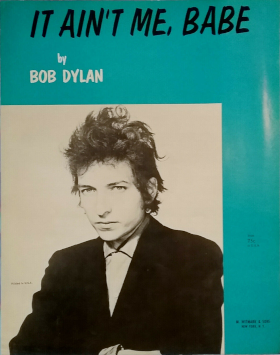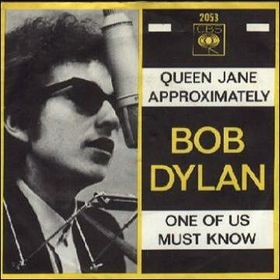
Joan Chandos Baez is an American singer, songwriter, musician, and activist. Her contemporary folk music often includes songs of protest and social justice. Baez has performed publicly for over 60 years, releasing more than 30 albums.

"The Night They Drove Old Dixie Down" is a song written by Robbie Robertson and originally recorded by the Canadian-American roots rock group The Band in 1969 and released on their eponymous second album. Levon Helm provided the lead vocals. The song is a first-person narrative relating the economic and social distress experienced by the protagonist, a poor white Southerner, during the last year of the American Civil War, when George Stoneman was raiding southwest Virginia.

"It Ain't Me Babe" is a song by Bob Dylan that originally appeared on his fourth album Another Side of Bob Dylan, which was released in 1964 by Columbia Records. According to music critic Oliver Trager, this song, along with others on the album, marked a departure for Dylan as he began to explore the possibilities of language and deeper levels of the human experience. Within a year of its release, the song was picked up as a single by folk rock act the Turtles and country artist Johnny Cash. Jan & Dean also covered the track on their Folk 'n Roll LP in 1965.
"Long Black Veil" is a 1959 country ballad, written by Danny Dill and Marijohn Wilkin and originally recorded by Lefty Frizzell.
"Babe I'm Gonna Leave You" is a folk song written by Anne Bredon in the late 1950s. Joan Baez recorded a solo version for her 1962 album Joan Baez in Concert and a variety of musicians subsequently adapted it to a variety of styles, including Led Zeppelin. Several songwriters have been credited on releases over the years, although Bredon usually receives a sole or partial credit on current releases.

Joan Baez/5 is the fifth solo album and third studio album by American folk singer Joan Baez, released in October 1964. It peaked at number 12 on the Billboard 200 chart. The single "There But for Fortune" reached number 50 on the Billboard Hot 100 in the U.S. and became a top-ten single in the UK.

From Every Stage is a double live album recorded by Joan Baez on tour in the summer of 1975. The first half of the album was acoustic, with Baez accompanying herself on her guitar, while the second half features electric backup. Baez' recording of "Blowin' in the Wind" from this album was later included in the Forrest Gump soundtrack album. The song "Natalya" was dedicated to Russian poet and human rights activist Natalya Gorbanevskaya,

Play Me Backwards is an album by the American musician Joan Baez, released in 1992. The album was nominated for a Grammy for Best Contemporary Folk Recording. Baez supported it with an international tour.

Ring Them Bells is a live album taken from Joan Baez' April 1995 shows at New York's The Bottom Line. In addition to her own solo set, the album featured collaborations with other female artists including Mary Chapin Carpenter, Mimi Fariña, Dar Williams, the Indigo Girls and Mary Black. Though Baez and many of the collaborating artists were admirers of one another, this album marked the first time many of them had worked together. Baez' manager, Mark Spector, served as producer.

David's Album is the tenth studio album by Joan Baez, recorded in Nashville and released in 1969. It peaked at number 36 on the Billboard Pop Albums chart.

One Day at a Time is the 11th studio album by Joan Baez, released in January 1970. Recorded in Nashville, the album was a continuation of Baez' experimentation with country music, begun with the previous year's David's Album. It is significant in that it was the first to include Baez' own compositions, "Sweet Sir Galahad" and "A Song for David", the former song a ballad for her younger sister Mimi Fariña, and the latter song being for her then-husband, David Harris, at the time in prison as a conscientious objector. One Day at a Time also included work by The Rolling Stones, Willie Nelson, and Pete Seeger.

Rare, Live & Classic is a 1993 box set compilation by Joan Baez. Released on Vanguard, where Baez had recorded her most influential work during the first twelve years of her career, the set also included material from her subsequent record labels, A&M, Columbia and Gold Castle Records, as well as a number of previously unreleased studio and live recordings. Bob Dylan, Bob Gibson, Mimi Fariña, Judy Collins, Odetta and Kris Kristofferson are among those who make guest appearances on the various tracks; also included were two tracks from a never-released album recorded in 1981 with the Grateful Dead.

"Silver Dagger", with variants such as "Katy Dear", "Molly Dear", "The Green Fields and Meadows", "Awake, Awake, Ye Drowsy Sleepers" and others, is an American folk ballad, whose origins lie possibly in Britain. These songs of different titles are closely related, and two strands in particular became popular in commercial Country music and Folk music recordings of the twentieth century: the "Silver Dagger" version popularised by Joan Baez, and the "Katy Dear" versions popularised by close harmony brother duets such as The Callahan Brothers, The Blue Sky Boys and The Louvin Brothers.

The Joan Baez Lovesong Album is a 1976 compilation of Joan Baez songs. Vanguard Records put it together as part of its Baez reissue series, after Baez left the label for A&M Records. The album is a collection of love songs, including traditional and contemporary work, as well as an arrangement of E. E. Cummings' "All in Green My Love Went Riding" by Peter Schickele. The cover painting is by the painter and musician Eric Von Schmidt.

The First Ten Years is the second compilation album by Joan Baez, released in October 1970. It rounds up highlights of her first decade with the Vanguard label.

"Queen Jane Approximately" is a song from Bob Dylan's 1965 album Highway 61 Revisited. It was released as a single as the B-side to "One of Us Must Know " in January 1966. It has also been covered by several artists, including the Grateful Dead and The Four Seasons.

The 49th Annual Grammy Awards was a ceremony honoring the best in music for the recording year beginning October 1, 2005, and ending September 30, 2006, in the United States. The awards were handed out on Sunday, February 11, 2007, at the Staples Center in Los Angeles. The Dixie Chicks were the night's biggest winners winning a total of five awards. Mary J. Blige received the most nominations, with eight. Don Henley was honored as MusiCares Person of the Year two nights prior to the show on February 9, 2007. The show won an Emmy for Outstanding Lighting Direction for VMC Programming.
"She Belongs to Me" is a song by Bob Dylan, and was first released as the second track on his 1965 album Bringing It All Back Home. The song may be about a former girlfriend, Suze Rotolo, or fellow folk singer Joan Baez, contemporary siren Nico, or Sara Lownds, the woman that Dylan would wed in November 1965.
David Paul Briggs is an American keyboardist, record producer, arranger, composer, and studio owner. Briggs is one of an elite core of Nashville studio musicians known as "the Nashville Cats" and has been featured in a major exhibition by the Country Music Hall of Fame in 2015. He played his first recording session at the age of 14 and has gone on to add keyboards to a plethora of pop, rock, and country artists, as well as recording hundreds of corporate commercials.

The 51st Annual Grammy Awards took place at the Staples Center in Los Angeles, on February 8, 2009, honoring the best in music for the recording year beginning October 1, 2007, through September 30, 2008. Robert Plant and Alison Krauss were the biggest winners of the night, winning five awards, including Album of the Year for their critically acclaimed album Raising Sand. Krauss became the sixth female solo artist to have won 5 awards in one night, joining Lauryn Hill, Alicia Keys, Norah Jones, Beyoncé Knowles, and Amy Winehouse. Lil Wayne received the most nominations, with eight.
















